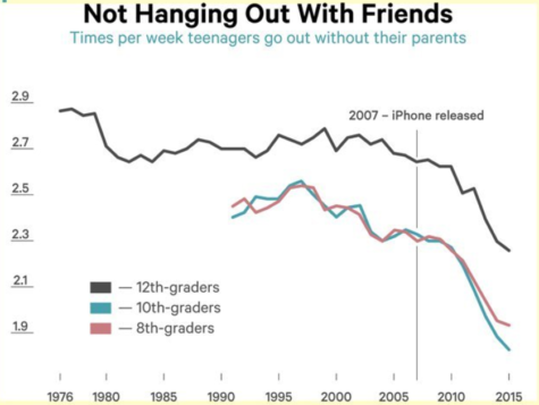Today's Women Feel Less Control Over Their Bodies Than Their Grandmas Did... Because of Smartphones.7/10/2018
Smartphones connect us in so many ways. They stunt us in so many others.
One of the most memorable op-eds I've read in 2018 -- and also one of the first -- was Megan McArdle's Bloomberg piece, Listen to the 'Bad Feminists' - They're the ones who still believe women have power. One excerpt in particular has stuck with me: It’s not that we’re opposed to #MeToo; we are overjoyed to see slime like Harvey Weinstein flushed out of the woodwork, and the studio system. But we see sharp distinctions between Weinstein and guys who press aggressively -- embarrassingly, adulterously -- for sex. To women in their 20s, it seems that distinction is invisible, and the social punishments demanded for the latter are scarcely less than those meted out for forcible rape. How, indeed? McArdle suggests it has to do with language: They feel this way because we no longer have any moral language for talking about sex except consent. So when men do things that they feel are wrong -- such as aggressively pursuing casual sex without caring about the feelings of their female target -- we’re left flailing for some way to describe this as non-consensual, even when she agreed to the sex. You know I love language -- two of my favorite books I read last year were The Secret Life of Pronouns and What the F: What Swearing Says About Our Brains, Our Language, and Ourselves. But... this explanation seems flimsy at best. Roue may have fallen out of popular use. But we still have words to describe assholes: players, kiss rapists, fuckboy, dick, and asshole, to name a few. Here's another, much more likely explanation: Smartphones. Seriously. Smartphones are great for so many reasons. Knowledge at my fingertips. Friends all over the world. Blogging from anywhere. The ability to manage a Happy Talent Facebook and Twitter page. Bla bla bla. But there is mounting evidence that smartphones and social media seriously disrupt children's social, cognitive, and emotional development. Which is obvious and makes so much sense. Everyone knows that humans are born able to learn a language -- but not able to speak one. We learn how to speak by listening, observing, trying and failing. But what most people don't realize... is that social skills and competence are the same way. We are born able to learn them, but we're not born with them. It takes kids a long time to realize that you don't know what they don't know. (Raise your hand if you used to think that if you can't see them, they can't see you.) It takes time to realize they can lie, and that others can lie to them. It takes time to learn that someone can feel happy (because their dad got a job) and sad (because now they have to move to a new school) at the same time. And one thing it takes especially long to learn... is how to say no. How to have uncomfortable conversations. How to deal with confrontation. (In fact, most people still suck at this into adulthood.) Kids from past generations learned how to do it by doing it. Playing unsupervised, they resolved their own disputes in the sandbox. By testing each other's boundaries, they learned how to say, "Yes, I like it when you squirt me with the hose!" and, "No, I don't like that -- please stop!"
Lacking the abundance of organized sports today's children enjoy, previous generations organized their own pickup sports games. They learned how to pick their own teams -- when it was fair to split up two power players, how to make the game fun, fair, and even, despite differing ages and ability levels. (After all, one of the prerequisites of having fun is that you ensure mutual enjoyment.) They learned how to make rules and settle disputes.
In real time. Without adult intervention. As they grew older and relationships grew more complicated, past generations necessarily had to have face-to-face conversations to smooth things over and get the results they wanted. This is something today's youth rarely have to do. According to iGen: Why Today's Super-Connected Kids Are Growing Up Less Rebellious, More Tolerant, Less Happy--and Completely Unprepared for Adulthood, today's 12th graders behave like the previous generation's 8th graders. They rarely leave the house without their parents, and they do the majority of their communication online. So if someone pissed you off, you can just ignore their messages. If you must have a difficult conversation, you can do it over your phone. Moreover, you can carefully craft your response, then have your friends proof and edit before you hit send. You can ruminate over whether to end the sentence with a period or not, or whether the :/ emoji is too much. Then... instead of having to deal with the person's response in real time, you wait. A minute. Five minutes. An hour. A day. And then the process repeats until the situation is resolved. Even better -- you can just post an angry meme and let the person infer you're angry, hurt, or upset. (See also: Why It's My Moral Obligation to Ignore Passive Aggression.) This is bad. Very bad. It means when they are finally in a real, face-to-face, potentially embarrassing or threatening or emotionally-charged situation, they will have had little practice on asserting boundaries, resolving conflicts, and saying no. Which may help explain why "the most empowered generation of women in all of human history came to feel less control over their bodies than their grandmothers did." Hopefully no one's flown off the handle at this point. Obviously, I think being sexually aggressive is wrong. But... when it comes to the sexual assault prevention literature, there are two main approaches: protectionism, and preventionism. The former focuses on teaching women how to avoid and escape from bad situations, though is sometimes labeled as "victim blaming" by preventionists. Preventionists focus on educating men not to rape, not to stalk and harass, etc. According to Laura Kipnis, author of Unwanted Advances: Sexual Paranoia Comes to Campus, these two schools of thought have a somewhat adversarial relationship. Which makes no sense, as obviously both are important. No matter what you do, you will never eliminate all the rapists, harassers, roues, and fuckboys. We can raise awareness and make it so there are fewer of them. But, eventually, #YesAll girls and women are going to be in a situation with a creep -- or even a well-meaning guy who lacks sexual experience and isn't familiar with her particular nonverbal cues. So shouldn't we discuss the reasons why so many feel so powerless to stop a man from touching them -- why, according to multiple conversations I've had and interviews I've read, some girls would prefer to give a blowjob they don't want to give (or because they've sobered up enough to realize they don't want to have sex)... because it's "easier" than saying no? Many women found viral sensations like Cat Person and the Aziz Ansari story incomprehensible. Maddening. I even wrote: Some women [have unwanted sex] because they have limited assertiveness, communication skills, or sexual agency. Similarly, they should feel comfortable saying things like, "Why are you touching me? You don't even know me," "Get your hand off my knee," "Stop -- that's inappropriate." And, yes. Even just, "No." In the digital age, learning how to communicate is something that isn't happening as naturally as it once did, and may be something we need to start teaching actively -- even or especially in sex ed. It's something you can even think about and mentally rehearse on your own -- after all, as I wrote in Women: Instantly Make Your Life Better By Learning This ONE Phrase: Men are actively, intentionally taught, in their pathetic little pickup artist classes, that "violating a woman's space" is one of the many ways you can manipulate them into unwanted contact with you. Because, yeah. While I totally hear women and girls when they say they did something because they felt forced, "like they'd already said no but had been either ignored or not heard," or intimidated... I also think it's important to think about ways to empower women to feel bodily control and autonomy... Kind of like their grandmas did. *** Want to know more? Check out:
3 Comments
Murphy
7/14/2018 07:00:16 am
This reminds me of that Kimmy Schmit episode where the interview says something like "I'm always surprised what women will do to avoid appearing rude."
Reply
Liz
7/17/2018 10:20:52 am
Did you see this article when it came out? https://www.nytimes.com/2018/05/30/opinion/women-stop-campus-rape.html
Reply
7/18/2018 11:44:40 am
Wow - I hadn't seen that, but they had me from the very first paragraph! I totally expected that story to end with, "And then he raped her," because that's how SO MANY of these types of stories start, and I was pleasantly surprised when she threw that elbow.
Reply
Leave a Reply. |
About the Author

Eva is a content specialist with a passion for play, travel... and a little bit of girl power. Read more >
Want to support The Happy Talent? CLICK HERE!
Or Find me on Patreon!
What's Popular on The Happy Talent:
Trending in Dating and Relationships:
What's Popular in Science: Playfulness and Leisure Skills:
Popular in Psychology and Social Skills:
Categories
All
|





























 RSS Feed
RSS Feed